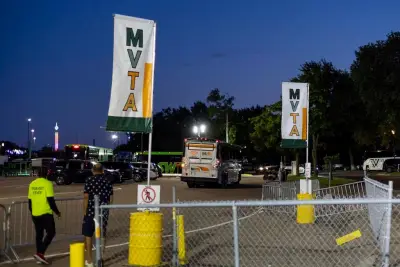Does the Twin Cities need the “opt-out” transit agencies anymore?

Like the people of Lake Wobegon the Twin Cities transit landscape is solidly above average at least if you compare it to the rest of the United States By measures like operations efficiency farebox recovery and governance structure we do well in the low-bar United States Twin Cities drivers and transit riders should be grateful for it and if you don t believe me find out how transit decisions are made in majority other American cities It can definitely get worse Regional map of where opt-out providers are located Credit Courtesy of Metro Transit The exceptions that prove the rule and one that I have long detected personally befuddling are the existence of the so-called opt-out bus operators In the Twin Cities metro four transit agencies have operated independently out of the south and west suburbs for years quietly and inefficiently doing their own thing sometimes against the grain Right now thanks to large-scale changes to regional transit funding the Met Council is now deciding how much money to allocate to these independent systems out of a new stream of metro tax dollars It s a good time to ask whether these agencies should even exist in the first place A brief history of opt-out transit The opt-out transit systems Minnesota Valley Transit Agency MVTA Southwest Transit Maple Grove Transit and Plymouth Metrolink are an historic remnant of how transit funding decisions evolved over the years They began back in when because of perceptions about geographic inequity around the then-existing Metropolitan Transit Commission MTC the state Legislature allowed suburbs to opt out of receiving regional transit system Related New B and Gold Lines illustrate the wide range of possibility for bus rapid transit It allowed cities all in the south and west suburbs to form their own independent agencies using their perceived share of regional transit funding In when the Metropolitan Council assumed planning and operational authority over the rest of the area s transit system it removed this option while leaving the opt-out providers behind Currently those agencies still operate facility out of the predominantly wealthier south and west metro areas running mostly commuter buses to downtowns and the University of Minnesota as well as special events often centered around expensive park-and-ride ramps There is also a dwindling share of regular highway arrangement with fixed schedules and stops as well as an increasing amount of micro mobility app-based organization similar to Uber or Lyft All the suburban agencies serve the State Fair of lesson which accounts for a essential chunk of annual ridership Represented by the Suburban Transit Association which heavily lobbies the Legislature these agencies represent a large share of the region s population but only a tiny percentage of the transit trips Especially in a post-COVID context where commuter transit has particularly struggled the future of these agencies is uncertain For example the two smallest city-led agencies Plymouth Metrolink and Maple Grove Transit are contemplating a merger that would combine their back-end offices An expensive fix for local concerns The pros and cons of this system should be familiar pitting local control against regional cooperation Independence supposedly allows agencies to be closer to their communities a vague catch-all term For example they might have more flexibility to hastily change arrangement It allows them to prioritize amenities like on-board Wi-Fi or cushy seats They can forgo employing union workers another big reason for dissent between our region s agencies In short opt-out buses have long been more luxurious and spacious than those run by Metro Transit around the suburbs thanks to higher cost-per-rider subsidies and decentralized planning The downsides of an opt-out system center on lack of efficiency scale and planning conflict As a whole multiple overlapping regime agencies are an expensive answer for local concerns and the opt-out agencies have a lot of duplicative overhead For example instead of one branding or ad campaign you have five It s the same for websites apps or other other administrative positions that scale effectively like HR offices or executive leadership In the present day all those costs are at present multiplied five-fold across the region What s more those costs are going up relative to agency budgets Even as ridership has shrunk the administration expenses at MVTA the largest of the opt-out providers have climbed From to the majority of modern year of community facts MVTA administrative costs have climbed from million to million more than doubling their overhead This was during a period when ridership decreased by over half and the budget remained largely flat There are also ongoing conflicts around planning and operations inherent to agency turf wars that have seemingly intensified over the last decade For example the Red Line to Apple Valley a -year-old bus rapid transit BRT project has been the scene of a very Minnesotan passive-aggressive battle over who is going to operate the buses i e between union and non-union drivers In Jiahong Pan wrote an in-depth examination of this fight for Racket detailing how the MVTA was running buses to capture Metro Transit s riders and even cutting off bathroom access There was a similar less-intense planning conflict around Orange Line arrangement a highway BRT line running south from downtown Minneapolis to downtown Burnsville straight into MVTA territory Metro Transit planners preferred serving the mixed-use Heart of the City neighborhood while MVTA agencies centered their facility on their Park and Ride facility across busy Highway At the time it amounted to needless duplication though MVTA has largely curtailed institution to the entire area due to ridership changes Time to end opt-out The current situation at the Met Council centers on the new regional sales tax for transit part of sweeping transportation statute passed in At the time the new three-quarter-cent metro sales tax passed seemed like a wave of new money for transit dramatically boosting and stabilizing Metro Transit s planning and construction bottom line In practice the vast majority of those dollars have gone to county governments to offset existing operational costs around light rail operation Gov Tim Walz s proposal to offset existing state funding with sales tax money took another bite from the transit pie Funneling another million to opt-out providers out of the small stream of remaining Metro Transit revenue would be another subtraction of sales tax money from the transit agency that provides the vast majority of provision Where the region s transit sales tax funding is going Credit Courtesy of Metro Transit Meanwhile in the rapidly evolving post-COVID era the opt-out agencies have been cutting back on fixed-route provision that runs along specific streets to specific bus stops through the often low-density institution areas and opting to increasingly use a dial-a-ride model that s kind of like a government-subsidized Uber provision with specific boundaries These discounted ride-hail vans are popular among the people that use them to be sure but are not really transit They don t scale and each truck only has one or two people in it at any given time making expanding the function almost limitlessly expensive Funding proposals for the opt-out agencies based on population or sales tax revenue Credit Courtesy of Metro Transit The status quo of bespoke inefficient transit is not a luxury we can afford and the wisdom of having an opt-out system is belied by the fact that state lawmakers took the opt-out option away in limiting our region s descent into California-style fragmentation The idea that every city would go it alone on something so fundamental as transit and transportation planning flies in the face of the tradition of Minnesotan regionalism and common sense Related Removing the mysteries of Twin Cities transit use with Transit App This month the Met Council will have to decide how much regional sales tax money to give over to the opt-out providers which in the present sits around million a year There are multiple proposals to keep or cut that allocation and Met Council members should use the opportunity to ask whether these agencies are helping or harming regional transit in the first place Given the post-pandemic shifting of transit demand and structure and the increasing albeit subtle conflicts between Metro Transit and the opt-out agencies I don t see a reason why the Met Council should be going out of the way to shovel more money into the opt-out system Given the increasing overhead share of their budgets from agencies like MVTA it might be time to formally end the opt-out system or at least bring their share of revenue back in line with regional priorities A coordinated transit structure is far superior to one with independent fiefdoms fighting for money and riders The post Does the Twin Cities need the opt-out transit agencies anymore appeared first on MinnPost


